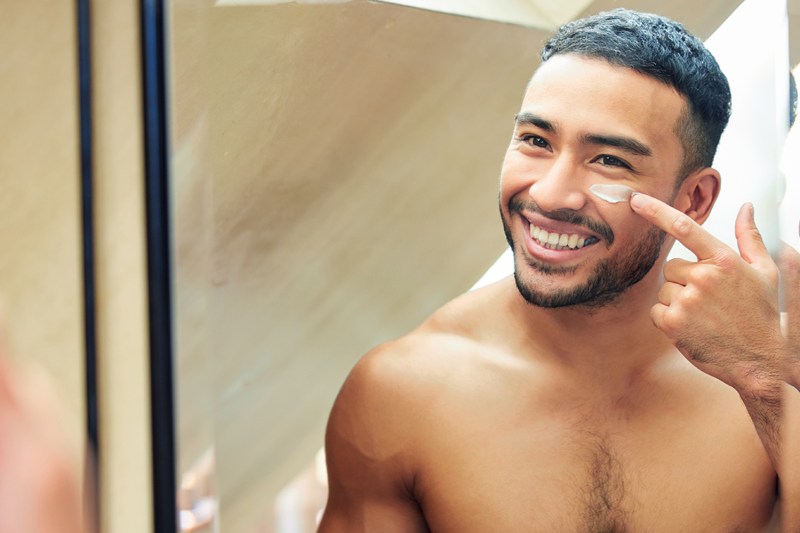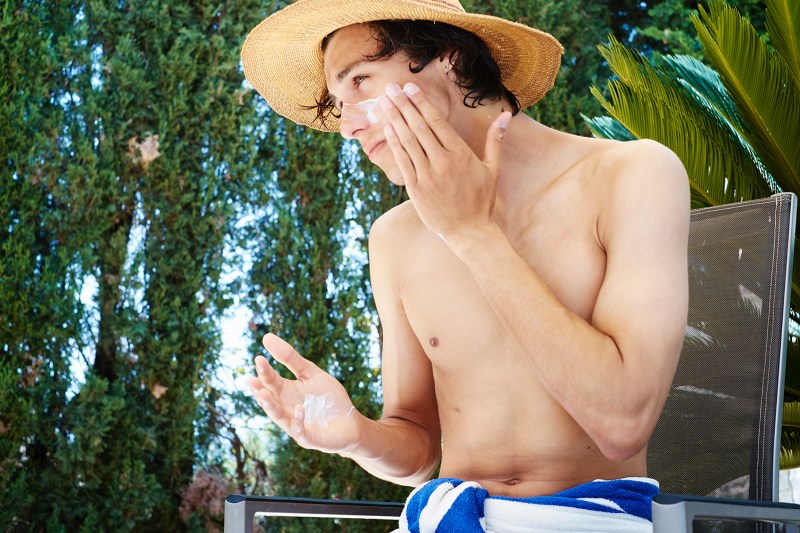
Retinol has gotten a lot of attention lately, and for good reason: It’s one of a few products currently on the market that is scientifically proven to stave off signs of aging. That’s a pretty big draw for anybody, regardless if you’re a newbie to the skincare game or if you’re a seasoned serum professional.
But as with any new product you put on — or in — your body, it’s important to know what retinol is made of and how it might interact with other products on your face before adding it to your skincare routine.
What is retinol?
What does retinol do for your skin? And what exactly is it?
Retinol is derived from vitamin A and is naturally found in some fish and dairy products. It’s been used in medicines and natural remedies as early as the ancient Egyptians, long before the term “skincare routine” was even thought of. Retinoic acid — or RA — develops in our skin naturally to battle cell damage and reduce the amount of nutrients that bacteria feed off of. Adding external retinol serum to your face speeds up the production of antimicrobial peptides (AMPs), which in turn fight signs of aging like wrinkles, dark spots, and even iron abnormalities.

How to start using retinol in your skincare routine
The first step is finding the right retinol for your skin. Start off simple — try a serum that doesn’t contain many other active ingredients to first determine how your skin interacts with a new product. Biochemist and science lead at OnSkin, Valerie Aparovich, suggests starting “with a product with lower-strength retinol (up to 0,01-0.03% for dry and sensitive skin).” Avoid any particularly sensitive areas for your first usage, and expand from there.
Once you find a serum that you like, start integrating it into your skincare routine every other day. Just because retinol is naturally occurring doesn’t mean you should dive right into everyday use. Too much of anything is never good, and retinol serum is no exception. Putting too much on your face, or anywhere else on your body, could lead to irritation, redness, and dry or flaky skin.
It’s usually recommended to use retinol at night, as it can be extremely sensitive to sunlight. At first, you will want to use retinol alone or with a noncomedogenic, odorless facial moisturizer. Take a pea size amount and apply it to your clean face before bed. If you notice your skin is becoming dry or flaky over time, reduce use of your serum to every three days.
It takes time and consistency with retinol. But rest assured that, if using your products correctly, scientists say you should be able to see results within three months.

What to mix with retinol — and what to avoid
As you become more comfortable using retinol, you can begin to incorporate other products into your skincare routine. A pro tip is to mix your retinol serum into your favorite facial moisturizer, such as a light hyaluronic acid. Aparovich explains, “Hyaluronic acid can support the skin against retinol side effects. It’s a potent humectant that prevents water loss and promotes moisture retention in the skin, thus helping to maintain healthy hydration levels, soothing the skin, and minimizing the risk of dryness caused by retinol.”
However, there are certain products that you should never mix with retinol, such as vitamin C powders or exfoliants. Dr. Anne Beal, founder of AbsoluteJOI, recommends “using retinol as part of your nighttime routine and using exfoliants and vitamin C as part of your morning routine to avoid mixing those products.”
Besides being harsh on your skin, vitamin C has another adverse reaction when paired with retinol. “There are certain ingredients that should never be mixed with retinol-based products,” says Dr. Rosmy Barrios, medical advisor for the Health Reporter, “One of them to avoid is vitamin C, which can cause retinol to break down and become less effective.”
One of the most common mistakes people make with their retinol is combining it with alpha hydroxy acid or beta hydroxy acid. These are your traditional cosmetics like glycolic, lactic, and mandelic acids. These ingredients, when mixed with retinol, could cause irritation and redness, because combined, they are too harsh for most people’s skin.
Medical Director of Renaissance Dermatology, Dr. Noor Hanif Said explains why: “Retinol encourages cell turnover, which contributes to its effectiveness but results in flaky and dry skin.”
Stop and take a look at what’s in your acne ointment, too, before adding retinol to your routine. Many popular acne treatments contain benzoyl peroxide, which also has a negative effect when matched with retinol.
Luckily, there are also plenty of other products out there that do interact well with retinol. Dr. Harikiran Chekuri says, “By combining retinol with the right ingredients, you can ensure that you’re getting the most out of your skincare products and achieving maximum results for your skin.”
Peptides, for example, interact with retinoic acid to enhance anti-aging effects. Hyaluronic acid, similarly, works well to protect the skin against any side effects that may come from using retinol, soothing dry skin and keeping it hydrated.
The biggest step you can take to protect your face after using retinol, though, is regularly applying sunscreen in the morning. As we learned above, retinol causes sensitivity to sunlight. Even if you put it on at night before bed, your face will still need that extra protection in the morning. Retinol is proven to be a great product for anti-aging, but there’s no point in using it if you don’t prevent further damage by skipping the sunscreen.



